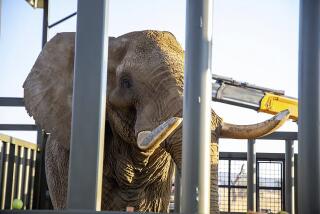Apple-Ball Helps Zoo Elephants Stay Fit
- Share via
PORTLAND, Ore. — It’s not exactly baseball, but the elephants at Washington Park Zoo are getting some “spring training” with a mechanical pitching machine.
Like baseball players taking the field for a game, the zoo’s 11 Asian elephants move into position to chase apples hurled from the machine, donated by the Jugs Pitching Machine Co. of Portland.
“We call it aerobic apple-chasing,” said Jane Hartline of the zoo staff. “The elephants spend a few minutes several times a day chasing apples.”
The elephants work out daily, rain or shine, to get in shape and stay that way, zoo officials said.
“The elephants would eat the apples anyway, so this way we’ll make sure they remain active,” said Jim Sanford, the elephants’ keeper.
The machine, set behind a concrete courtyard wall outside the elephant building, has been adjusted to lob apples into the yard, rather than fire them in a straight line.
“Otherwise, the elephants would just stand there with their mouths open, waiting for the apples to come to them,” Sanford said.
Automatic Rewards
The world’s largest zoo collection of Asian elephants goes after the fruit like infielders chasing ground balls. The pachyderms scoop up the apples with their trunks and pop them into their mouths.
“This is good for all of them, especially for a couple of the elephants who have arthritis,” Hartline said. “They all can use the exercise, particularly Rose and Me-tu, who’s pregnant. They both tend to be lazy.”
The elephants seem to know it is all a game. Sometimes they tire of the chase and lumber over to the wall, open their mouths wide and beckon for a handout.
When the machine operator won’t hurl the apples directly into their mouths, they stroll back into the yard and resume the chase.
Elephants are territorial, and there is a hierarchy in each herd, Hartline said, so the most powerful ones stake out the area where most of the apples land.
Smaller and Smarter
Suzy, one of the smaller elephants and lower in the pecking order, has learned to outsmart the competition.
“Suzy has learned which way the apples are going to go, so she starts running before the machine fires so she can get to the apples before the others do,” Hartline said.
The activity also is good for the elephants’ feet, keepers said.
Elephants in the wild walk for miles in foraging for food, but those in captivity are less active and must have their nails and sole calluses trimmed several times a year.
More to Read
Sign up for Essential California
The most important California stories and recommendations in your inbox every morning.
You may occasionally receive promotional content from the Los Angeles Times.













